Atlantic Monthly Contributors's Blog, page 872
November 25, 2013
Sandra Bullock Wins the Year
 AP
AP Today in Hollywood news: Sandra Bullock has been named the year's best entertainer, Elizabeth Olsen is officially an Avenger, and finally 50 Cent and John Cusack are in the same movie.
Sandra Bullock was the most entertaining person this year. That's what Entertainment Weekly says, anyway. And they would know! It's right there in their name. But yes, they've named her the 2013 Entertainer of the Year, presumably because she was in the big successful hits The Heat and Gravity this year, and not because she, I dunno, was a good dinner party guest at the editor of EW's house or because she's secretly great at juggling, which she does, unbeknownst to us, down on the Santa Monica Pier. I think they mean her movies. Which is fair! Sandra Bullock had a very good year, movie-wise. A well-received blockbuster comedy in the summer, and then a well-received blockbuster thriller/drama in the fall, which might just earn her another Oscar nomination. I mean, who else did that this year? Did anyone? I don't think so, and thus Sandra Bullock wins the year. If you did that this year and were somehow overlooked, please write in or comment below to tell us, but otherwise? 2013 firmly goes to Ms. Bullock. [Entertainment Weekly]
This is odd. Even though Elizabeth Olsen was on The Daily Show last week talking about how she's going to play Scarlet Witch in the Avengers sequel Age of Ultron, Marvel has only just now confirmed that she, and actor Aaron Taylor-Johnson, will be appearing in the film. People already knew this was happening, is the thing, but Marvel hadn't yet made it official for some reason. But now it is. Olsen will be Scarlet Witch and Taylor-Johnson will be her brother Quicksilver. Who knows how big their parts will be, but there you have it. They're officially in. No more rumors, or direct statements from actors on talk shows. The mystery is over. [The Hollywood Reporter]
Jason Patric and John Cusack have joined Bruce Willis in a thriller called The Prince, which is presumably about actors who were huge in the '90s suddenly horrified to find themselves in the year 2013. (Not that Bruce Willis really ever stopped being huge, but just go with it.) Jonathan Schaech is also in it, so that would sort of support the theory. Though, 50 Cent and Rain are also in the movie, and they don't really fit that bill, so who knows. Well, actually, we know. We do in fact know. Deadline says the movie is about "a retired Las Vegas mob enforcer who is forced to return to the city and face his former enemies when his teenage daughter goes missing." Willis was going to play that role, but now Patric is, with Willis in a smaller part. Hopefully Rain and 50 Cent play themselves. Or, actually, hopefully John Cusack plays himself. [Deadline]
Wilmer Valderrama has been cast on Robert Rodriguez's From Dusk Til Dawn series that he's making for his El Rey network, an English-language cable channel aimed at a Latino audience. Valderrama will play a mysterious crime lord on the show. It's unclear if he's good or bad, but drug lords don't tend to be good. This could be interesting! From Dusk Til Dawn is a fun movie, so this could be a fun show. And Wilmer Valderrama is... fine. That diss show he had was a little sad, but otherwise, sure. No problem. [Deadline]












One of the Finalists of 'Arabs Got Talent' Is a White Woman from Boston
The Got Talent formula is pretty straightforward — someone slightly odd comes on stage, seemingly destined to fail, but ends up wowing the audience and the judges. Jessica Grout is a 23-year-old white woman from Boston who speaks zero Arabic, but she impressed the judges of Arabs Got Talent in September by singing "Baeed Annak," a famous love song by Egypt's Umm Kulthum, in Arabic while playing an oud. In an interview with The Guardian published on Monday, Grout said that after discovering Lebanese singer Fairouz in college, she moved to Morocco after graduating to check out music scene, but apparently not to learn Arabic. "I have a natural ear for picking up accents, but not necessarily for languages," she said.
The audience laughed when one of the judges had to repeat "What's your name" in English, and they laughed at her American-tinged singing through the first few bars of the song. But then reality TV magic kicked in and the audience, along with the judges, were cheering for her, singing along, completely won over. They were just surprised that she was there at all.
“We have for so long imitated the West, and this the first time that a person who has no whatsoever link to the Arab world, an American girl who does not speak Arabic, sings Arabic songs," Najwa Karam, the judging panel's Lebanese equivalent of Paula Abdul, said at one point, according to a recent Morocco World News story. In the same post, Youssef Sourgo wrote that, "Music is an artistic form through which cultural differences blend to generate beautiful outcomes," later adding, "America couldn’t have wished for a better ambassador to the Arab world." Last week Grout made it to the finals with an operatic performance of "Ya Toyoor” by Syrian singer Asmahan.That's not to say everyone's been won over by this feel-good story about an American appreciating other cultures. According to Laha magazine, there's been some controversy over whether an American should be allowed to compete, since she's not Arab (though, as Huffpost Maghreb points out, non-natives have won Got Talent iterations in other countries). And last week, Karam got some flack for voting for Grout over the Arab group Entourage. "Everyone should understand that when I say YES or NO, It’s never based on the contestants’ nationality, be fair, shame on you,” Karam tweeted in response, according to a translation by JTmagz, a Lebanese entertainment blog for teens.
Then there's the conspiracy theory that she's not American at all. "Is it just me who think there’s something not quite right with the “American” girl Jennifer Grout on Arabs Got Talent?" one viewer wrote on Tumblr. "She claims to be 100% American and then sings in perfect Arabic but her English doesn’t sound native to me :/ weird." Doubts aside, Grout is one part musical ambassador, one part oddity, and perfect for reality TV.












Robert Redford Eating Bread Is the Best New York Times Magazine Video
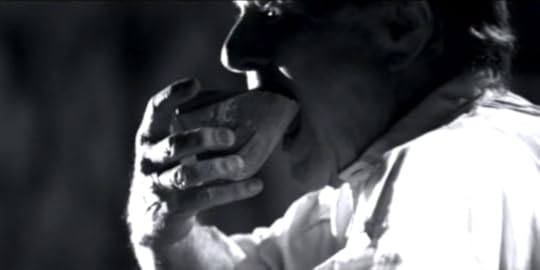 New York Times
New York Times If you ever wanted to see Robert Redford eat a piece of bread like a turtle, it's your lucky day.
It's become something of an annual tradition that, around the holidays The New York Times Magazine will put out a series of arty, completely self-indulgent, but utterly entertaining video shorts featuring famous actors looking gorgeous.
This year the guiding concept was to feature the stars in short films by acclaimed cinematographer Janusz Kaminski, each featuring a line from a notable writer. Some of the lines are more like mini-monologues (like the one Sarah Polley wrote for Oprah) while others are truly bizarre one-liners. The one-liners make for the best videos, with Redford's taking the cake for sheer non sequitur wonderfulness. His video features triumphant music as the camera pans, in stark black and white, over bread and milk, and Redford sharpening a knife. Then, he declares, just before eating: "Actually, I've never really liked tofu." The line was written by Seth Rogen and Evan Goldberg, and Redford delivers it almost halfheartedly. Like, look at me, I'm Robert Redford, I'm like almost too cool for this. It's the best.
Watch all of the videos here.












Don't Talk to Your Family About Politics at Thanksgiving, No One Cares
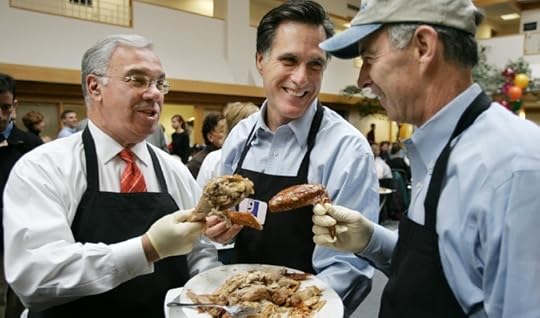 Associated Press
Associated Press On Wednesday, MSNBC's Chris Hayes will devote his show to a topic that should ruin a few family dinners: How to argue with your conservative relatives about politics. It mirrors a for-some-reason resurrected Slate post from last year at this time, in which John Cook describes how to pick a fight on politics. (Mediaite's Noah Rothman, 369 days later, suspects that the piece is "quite satirical.") But, honest to God, if you bring up politics over Thanksgiving dinner — particularly with an aim toward convincing someone of something — you're a bad family member or friend and should never be invited back.
In Cook's defense, politics was a little less avoidable last year at this time, coming close on the heels of President Obama's reelection. Presidential campaigns are fun, demanding that self-respecting adults draw an opinion on one candidate or another and, in theory therefore, on certain policy positions. Unless you are a complete political junkie and / or are paid to pay attention to politics, however, the year after a presidential race is meant to offer normal people a chance to ignore politics for a while. We do not all need to have an opinion on everything all the time; we do not all spend a lot of time formulating opinions or doing the research that would be useful in doing so. So insisting that people who've decided to get together to eat turkey care or opine about the minutiae of politics — a wormhole of deep tedium and incessant contrarianism — is obnoxious. Deeply, deeply obnoxious.
What happens when you demand an opinion of someone on something that they do not care about? One of two things. Either they, one, will become immediately annoyed and hate you and probably yell at you or, two, they will make up an opinion that fits loosely in line with their political beliefs. In neither instance are you making any progress. In the former, you will get in an actual fight in a venue where most people have knives at their immediate disposal. In the latter, you will not convince someone to adopt your point of view, because their opposition will be based on emotion, not rationality. This will not work.
But apparently people need guides on these things. So, with no more ado, our List of Thanksgiving Tips™ for how to avoid and, further, curtail any tedious discussion about politics.
Tip 1: Do not mention obvious political topics. This is pretty straightforward. Do not mention: Healthcare.gov, Obamacare, immigration, Ronald Reagan, the NSA, the Arctic, hanging chads, the Lend-Lease Act, any of it. It seems prohibitive, to be sure, this lengthy list of things for which there exist political overtones. But it's really not! Talk about your family. How they're doing. Their friends. Their jobs. Sports. The weather. The neighborhood. Your city (but not its leaders). Pets. We are not Fox News or CNN; we do not need to fill hours with we're-keeping-an-eye-on-this breaking news alerts about issues that keep Obama up at night. We are normal people who actually have lives that do not revolve around matters of universal importance. Embrace that.
Please note: You may think it is OK to talk about politics because you think all of your Brooklyn/Charleston friends agree with you on everything. They don't.
Tip 2: Do not try to trick people into talking about politics. You think you are clever, perhaps, as do we all, and you may try and trick your hated uncle into weighing in on Obamacare so that you may explain to him the issues related to the website and/or what you think it means for 2014. You get to talk about politics; you do not get the blame for bringing it up.
While passive aggressiveness is a tried and true Thanksgiving tactic, this is a particularly lame way to do it. Use your passive aggression to instead point out that your cousin's new "look" doesn't really work very well for him or to suggest that perhaps your nieces and nephews should sit down and eat instead of being little idiots running around all over. Focus, is the point. If you must undermine those around you, do it in a way that will still be relevant at next year's Thanksgiving.
Tip 3. If someone brings up politics, treat it as you would any other unpleasant and undesired topic. Let's say you're sitting across from your grandmother, and she proceeds to describe the battery of tests to which she was subjected, revealing that her rash was impetigo that required a special cream for treatment. You do not want to talk about this, because it's gross. What do you do? You change the topic. "Oh, well I'm glad they figured it out! Is that why you're wearing that beautiful blouse, Gran? Where did you get it?" And: boom. Topic changed.
You have this skill. You know how to 1) be nice but also 2) not talk about things you don't want to talk about. Worse comes to worse, you get up and go to the sideboard / kitchen / KFC for more sides. By the time you get back, the topic has likely changed regardless. In order to make Thanksgiving one that can be enjoyed by non-jerks, take this approach to political topics.
Tip 4. If someone tries to pick a fight about politics, respond flatly. Say: "You are ruining Thanksgiving, because only rude, self-centered people with chips on their shoulders insist on foisting their political beliefs on groups of loved ones in a venue where it's nearly impossible to avoid contentious conversation." Say: "I won't be goaded into this, and I don't appreciate your bringing up the topic. Let's talk about something else." Say: "Did you see Gran's new blouse? Gran, where did you get that?" (Note: You may call your grandmother something besides "Gran;" substitute that word where appropriate.)
The point is this. You only want to talk about politics to prove how smart and savvy you are. Use that urge for good. Let your high road be the one in which the greater good stands to benefit.
And Mediaite, if you're reading this next year: We mean this quite sincerely.












Did the Comet ISON Just Disappear?
 NASA
NASA If the comet ISON makes it out intact from its encounter with the Sun this week, the Earth is in for a potentially dazzling sight in the December night skies as it passes close to Earth and out further into the solar system. But scientists are starting to emphasize the "if" in that sentence a bit more today, after some observed what appears to be a sudden drop in the light emitted from ISON, along with an apparent explosion of dust production. Those observations could mean that the comet broke apart during its approach to the sun.
This, however, does not mean that ISON is definitely gone. Comets are basically masses of dust, gravel, and rocks, all bound together by ice. ISON is at the beginning of what could be its first and only pass around the Sun, and its orbit takes it extremely close to the star. This also makes it really hard to observe what's happening to ISON right now. As Slate's Phil Plait explains:
That’s not the only possible explanation! It's been suggested that ice is distributed approximately evenly across the surface of the comet, and is finally starting to be depleted. The comet may yet still be intact, and this observation was so recent (from earlier today) that we don’t yet know what’s going on.
The NASA ISON Comet Observing Campaign adds, "we do still need to keep observing the comet to be sure what it happening...the last time we saw an object like this was never!" So basically, even as far as comets go, ISON is pretty darn hard to read, although the observing campaign says today's observations are a "little worrying." It's way too early to say whether ISON is still with us.
Assuming ISON is A-OK today, the real drama for the comet's fate comes on Thursday, when it passes through the Sun's atmosphere. Given that the Sun is more or less at the peak of its solar cycle, that increases the probability that the comet could take a direct hit from a solar storm. That, NASA explains, probably wouldn't hurt the core of the comet. But it could lop off its tail. And if ISON did break apart today, we probably won't learn about it in anything approaching a definitive manner until Thursday, too.
Because NASA is the best, they're hosting a Thanksgiving day Google Hangout to let everyone join in the fun of figuring out whether the comet has survived the Sun. That hangout, brilliantly, is called Fire vs. ISON.












The 'Pope Francis Effect' Doesn't Really Exist in the U.S.
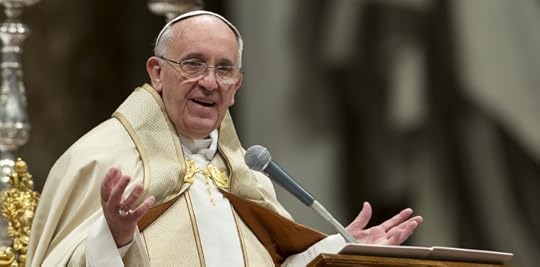 AP
AP Cool Pope Francis is so rad at being Pope that some have started anticipating the start of a global "come to Jesus (or Francis) moment" among Catholics. Termed the "Pope Francis Effect," the theory goes that Francis is inspiring many Catholics to start becoming more active in the church again. And while one poll tracking church attendance in Italy seems to suggest that Francis is filling the pews, a new analysis of Catholic attendance in the U.S. suggests that the Francis Effect is not so much in effect in the States. According to Pew, Catholic identification and weekly Mass attendance has held steady since the Pope's election last spring.
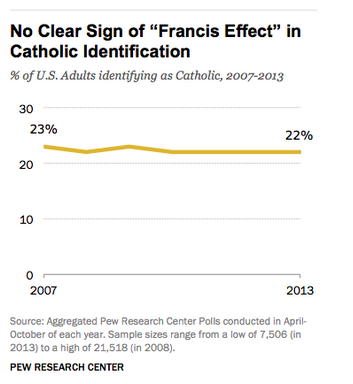 Source: Pew Research Center
Source: Pew Research Center Since 2007, U.S. Catholic identification has remained steady at about 22 percent of the population. That hasn't changed since Francis's election in March, according to Pew, citing data from the end of October 2013. And 39 percent of American Catholics self-report weekly Mass attendance, which is about the same as last year's figure of 40 percent. In general, survey respondents tend to self-report a higher frequency of church attendance than their actual history would show, so the real figure of Catholic Mass attendance is probably a bit lower than that.
In case you're not familiar with the Francis Effect, here's a sample of the theory from a representative piece in Forbes:
The other important aspect attributed to the “Pope Francis Effect” is a significant global rise in church attendance. It started in Rome, rapidly spread to the rest of the country and then to much of Europe, and now is being reported all around the world “by the hundreds of thousands,” according to the Italian Center for Studies of New Religions.
NBC reported on the touted effect as well, relying on anecdotal evidence of lapsed American Catholics "lured" back into the church by Francis's message. But even that piece cautioned that "it's unknown how many others have joined Rosa around the country and globe and the vast majority of lapsed Catholics have not been enticed back."
It is true that some country-specific polls have indicated increased church attendance after Francis. Take Italy. The recent study from the Italian Center for Studies of New Religions cited above asked priests from a sample of Italian congregations to report church attendance since Francis's election. About 50 percent of the congregations had increased in size, according to the survey's results. The same researchers also asked the same question of a small sample size of British Catholic priests, finding that 65 percent reported a rise in attendance.
The idea of such an effect rippling worldwide caught on quickly based on the Italian data, and for a good reason: the message the new Pope sends, while not quite as liberal as it may seem, pushes for a different emphasis from the Church. And it's a message that is, in fact, popular, even among some non-Catholics. Without challenging the church's anti-abortion and anti-gay marriage stance, Francis's message doesn't emphasize them. Instead, the Pope mostly talks about poverty, anti-materialism, and inequality. That left many hopeful that the Pope's message could quickly change the feel of the Church worldwide.
But it's not that easy. In the U.S., for instance, one of the church's most influential bodies has done little to change its politically-charged message. Earlier this month, the United States Conference of Catholic Bishops elected its former "defense of marriage" chair to head the organization. And while doing work to promote the Church's view on marriage — that it is only for opposite-sex couples — does not conflict with the Pope's teaching, the emphasis here reads as incongruous with his message, to say the least. The U.S. leadership, however, might want to look at how Francis's message is playing in this country: nearly 80 percent of U.S. Catholics have a favorable view of Francis, as does 58 percent of the general population.












AMC Orders 'Revolution' Copycat and 18th Century Antihero Pilots
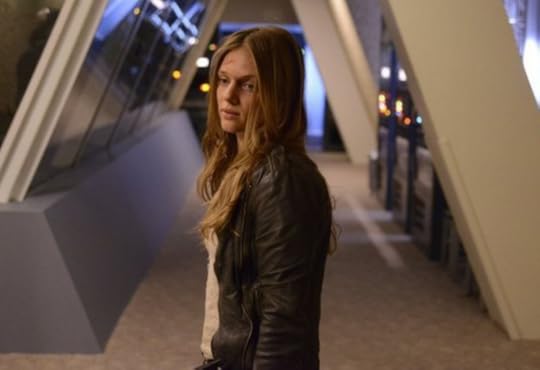 A scene from NBC's Revolution which is not Galyntine. (NBC)
A scene from NBC's Revolution which is not Galyntine. (NBC) What does the future hold for AMC without the likes of Breaking Bad, which ended in September, and Mad Men, which has just one season left? Well, perhaps a technology-less world à la NBC's Revolution and a rogue doctor in 18th Century London.
AMC ordered two new drama pilots today. The first, set to be produced by Ridley Scott, is Galyntine, which is already raising eyebrows for sounding pretty much exactly like NBC's Revolution. James Hibberd at Entertainment Weekly sees the similarity as full circle, as Revolution is sorta like AMC's own The Walking Dead. Vulture's Margaret Lyons tweeted: "Is there a phrase less inspiring than 'In the vein of NBC’s Revolution'? Oy." Meanwhile, the official synopsis says that Galyntine is "a wholly-original vision" that "takes place at a time after a cataclysmic technology-induced disaster has resulted in a new society that has eschewed any form of technology."
The other pilot announced continues the network's trend of period pieces. Knifeman, which has the honor of being the network's dumbest-sounding title to date, is about a doctor in 18th Century London. He sounds like your typical antihero: "a charming, arrogant, decorum-breaking genius who challenges societal norms to transform his visions into cutting-edge discoveries." He's also "hard drinking, hard living." He harvests organs for extra money. Sounds sorta like 18th Century House, mixed with Sweeney Todd.
Only time will tell whether these will inspire the same fervor as a Breaking Bad, or same numbers as a Walking Dead. AMC, with its thinning roster, can only hope.












What Is Chuck Grassley Saying About Chris Christie's Weight? An Investigation
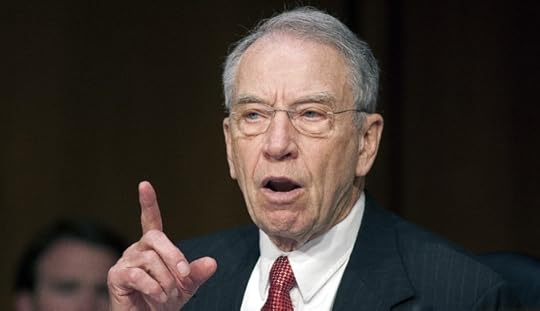 Associated Press
Associated Press Iowa Sen. Chuck Grassley, known far more for his cryptic/baffling Twitter account than his profound political assessments, added another puzzler to his canon over the weekend. In an interview with Des Moines' NBC affiliate, WHO TV, Grassley declared that, given New Jersey Gov. Chris Christie's "physique," "wouldn't it be kind of nice to have a guy like him sitting on the pot" when Washington blows up?
We have no idea what this means. But we do have some theories.
Here's the clip, via Daily Caller. Grassley's comments — which, we assure you, contain no other context — begin at about the 3:30 mark.
One thing for sure about, uh. Just look at his physique, you know. When Washington’s ready to blow up, wouldn't it be kind of nice to have a guy like him sitting on the pot?Theory 1: Chuck Grassley often says confusing things; this is no exception.
Fred and I hit a deer on hiway 136 south of Dyersville. After I pulled fender rubbing on tire we continued to farm. Assume deer dead
— ChuckGrassley (@ChuckGrassley) October 26, 2012
Last December, Gawker outlined Grassley's 15 best tweets of 2012. The winner was the tweet at right, about Grassley and his friend Fred and a deer they killed. But it is also the exception to the rule, being understandable and actually conveying information. Unlike this one (#8) or this one (#14).
In other words, when Grassley offers some inexplicable pronouncement, it's often difficult to suss out any meaning whatsoever. When he isn't, he's just telling a weird story. In this case, Grassley's comments make sense as English, but that's about as much as we can assert.
Theory likelihood: Medium. Perhaps this is a level of bafflement not before seen.
Theory 2: Grassley is using some local Iowa expression.In an effort to determine if this actually made perfect sense to Iowans (like Grassley) or an Iowa audience (like the people in Des Moines, watching WHO), we called the University of Iowa and Iowa State English departments. But they were all on vacation for Thanksgiving.
We also reached out to people we know in the state. One, Iowa native Aaron Hilliard, responded as follows when we read him the quote: "Wait, what?"
Calling it "a jumble of words and ideas," Hilliard speculated that it was "a mix of shit or get off the pot and a dig on his weight." One thing was clear: "That is not a popular Central Iowa idiom." (Hilliard also asked if Grassley was endorsing Christie; we admitted we weren't sure from the context.)
Likelihood: Zero.
Theory 3: Grassley is making an allusion to something.Then we thought, maybe Grassley is making a pop culture reference? We came up with three options.
1. Grassley is referring to someone throwing a grenade. In Hollywood lore, the salvation of any military unit is the person who, seeing a grenade landing among his peers, throws his helmet on top of it and then himself on the helmet. Maybe Grassley said "pot," but meant "helmet"?

2. Grassley was referring to the scene from Jurassic Park at left. We're not sure how that might be the case, but who knows.
3. Grassley is referring to Trey Radel. Think of it this way: When Washington's ready to blow up, wouldn't it be nice to have someone of Christie's physique sitting on the pot? Perhaps Grassley thinks "blow up" is a reference to use of cocaine. So what he's really saying is that Christie, a large gentleman, can keep people from accessing a large stash of marijuana as the city is ravaged with drug addiction.
Likelihood: That first one seems possible, right?
Theory 4: Even Chuck Grassley doesn't know what he was saying.Yes, who knows.
Likelihood: You be the judge.












The Newtown Shooter Was Obsessed with Other School Shootings
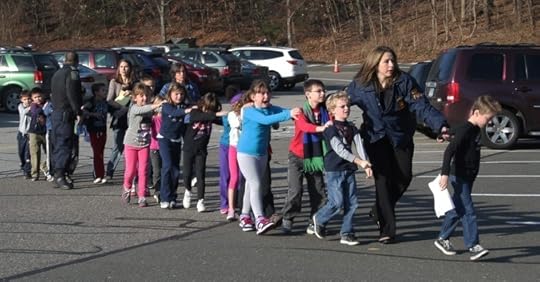 AP/NEWTOWN BEE, SHANNON HICKS. DEC. 14, 2012
AP/NEWTOWN BEE, SHANNON HICKS. DEC. 14, 2012 Update: The Sandy Hook report was released this afternoon by the Connecticut State Attorney's office. The report, a summary of the police report on the tragedy, confirms that the gunman, who took his own life, acted alone. No criminal charges will be filed as a result of the deadly mass shooting. The report also contains a timeline of events, and confirms that all of the weapons used by the gunman Adam Lanza were legally purchased by his mother, Nancy. According to the report, the time between the first 911 call from the school and the first officer entering the building was six minutes.
Here are some other details from the investigation:
For awhile after the shooting, officials searched for a second shooter. It turns out that law enforcement officials detained at least four people near the school as possible suspects: a parent with his cell phone out in the school parking lot, two reports who were found in the woods near the school, and someone from New York who happened to be in town. He heard about the shooting and went over "to see what was going on." Here's a description of Adam Lanza's room: "The shooter’s second floor bedroom windows were taped over with black trash bags. The second floor computer room also had its windows covered. There, investigators found a computer hard drive that appeared to have been intentionally damaged. To date, because of the extensive damage, forensic experts have not yet been able to recover any information from that hard drive. " Among the items found in Lanza's room: several video games and relevant materials, including Dance Dance Revolution; a Christmas check from his mom, apparently designated for him to buy a CZ 83 firearm; a New York Times article on the 2008 shooting at Northern Illinois University; photographs that appear to show a dead body; the book Amish Grace: How Forgiveness Transcended Tragedy, on the 2006 Amish school shooting, and "Photocopied newspaper articles from 1891 pertaining to the shooting of school children;" and a "spreadsheet" documenting and categorizing mass shootings over time. There's also a list of electronic items from seized "digital evidence" belonging to the shooter, which include the computer game "School shooting," images of Adam Lanza holding a gun to his head, and a "large amount of materials relating to Columbine shootings and documents on mass murders" Lanza owned a GPS device, which shows that he took a trip to the vicinity of the school on the day before the shooting. In November of 2012, Nancy Lanza expressed concern for her son, based on his behavior, which included the fact that "he hadn’t gone anywhere in three months and would only communicate with her by e-mail, though they were living in the same house." That included a period of time after the October 2012 Superstorm Sandy, which left the Lanza home without power. The total weight of the guns and ammunition carried to the scene by Lanza was 30.47 pounds. Over the years, Lanza underwent a series of mental health evaluations. He was diagnosed with Asperger’s Disorder in 2005. Evaluators noted "he lackedempathy and had very rigid thought processes." It was recommended that he take up medicinal and behavioral therapies, all of which he refused. However, the report makes the following note on the connection between his mental health issues and the events of December 14:
It is important to note that it is unknown, what contribution, if any, the shooter’s mental health issues made to his attack on Sandy Hook Elementary School. Those mental health professionals who saw him did not see anything that would have predicted his future behavior.
The report does not answer the question most asked about the actions of Adam Lanza that day:
The obvious question that remains is: “Why did the shooter murder twenty-seven people, including twenty children?” Unfortunately, that question may never be answered conclusively, despite the collection of extensive background information on the shooter through a multitude of interviews and other sources. The evidence clearly shows that the shooter planned his actions, including the taking of his own life, but there is no clear indication why he did so, or why he targeted Sandy Hook Elementary School.
Original Post: Just weeks before the one-year anniversary of the Newtown tragedy, the Connecticut State Attorney's office will release a long-awaited report on the Sandy Hook Elementary school shootings. On December 14 of last year, Adam Lanza killed 26 people, including 20 first-graders, at the school, and then shot and killed himself. The report is expected to provide a clearer timeline of events from that day, possibly with some photographs of both the school and Lanza's home.
The release is also one of the first big tests of the state's attempt to manage two, often conflicting, elements of the shooting's aftermath. First: there is the unified demand for privacy from the residents of Newtown and the victims' families. And second: there is the public right to access records from the state, including the worst details of the report itself.
Right now, we still know relatively little about the timeline of events before, during, and after the tragedy. Today's release of the official timeline will do some work to fill in the gaps, but the vast majority of public records on the shooting are still withheld, which has frustrated the state's governor Dannel Malloy. Earlier this month, Malloy told reporters that the report took way too long to come out:
"This has gone on longer than any of us would have liked and certainly is not representative of how I would have handled the timing of this report. It needs to get out. It needs to get out this week; next week; it needs to get out."
Earlier this year, Connecticut passed a law restricting the state's Freedom of Information transparency law, allowing officials to withhold visual images of a homicide victim if those images could "reasonably be expected to constitute an unwarranted invasion of personal privacy of the victim or the victim's surviving family members." The law also restricts the release of audio from law enforcement calls in which the condition of a victim is described. Emergency 911 calls are exempted from that restriction. The state created a task force as part of the law to determine further restrictions and revisions to the state's transparency laws. While the restrictions apply to crimes other than the Newtown shootings, they were passed specifically to restrict the release of otherwise public information on the mass shooting.
To prepare family members of Newtown victims for today's report, the state attorney's office consulted with family members on its content. Family members and Newtown residents have provided several arguments against the release of information on the school shooting that would typically be available with other crimes. Those arguments include the young age of the victims, a general sense that the community should be able to recover in private, and a fear that more information on the crime could lead to continued harassment of the family members by conspiracy theorists.
Reflecting that concern for the families, the state attorney's report is more or less a short summary of a longer police report into the tragedy. The procedure is a big change from how public information is usually released following a crime. The full report (in a redacted form) is likely thousands of pages long, and officials probably won't release it until some time next year. The Associated Press has more on how the state has argued for their secrecy surrounding the investigation into Newtown:
Sedensky, the state's attorney for the Danbury region, said he was spending roughly half his time on the Sandy Hook investigation between meetings with police and working with victims' families. Victims' relatives have said Sedensky told the families he would do what he could from a legal standpoint to address their concerns about what might be released publicly. One argument raised by Sedensky is that if identities of 911 callers are released, they could be harassed by conspiracy theorists accusing them of being "crisis actors."
The 911 calls from the incident could be released in the coming weeks, since the state's Freedom of Information commission overruled the decision by Newtown officials to keep those tapes private.












Obama's Immigration Speech Was Interrupted by a Heckler on Stage with Him
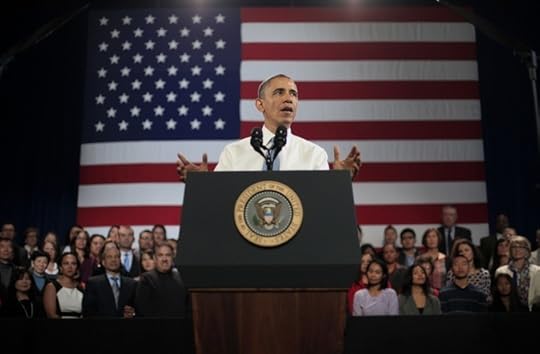
During his speech from San Francisco on Monday, President Obama was heckled by someone from an unexpected group: one of the people selected to stand onstage behind him.
Near the end of Obama's speech, a man standing about five rows behind him interrupted the president to call for the president to sign an executive order ending the deportation of undocumented immigrants. For a brief period, the man and and others in the audience chanted, "Stop deportation! Yes, we can!" When Secret Service moved in to remove the protestor, Obama told them not to.
Instead, the president — clearly miffed — explained why he couldn't unilaterally halt the deportation process. "You have the power to stop the deportation process," the young man said. "Actually, I don't," Obama responded.
If in fact I could solve all these problems without passing something in Congress, I would do so. But we're also a nation of laws. That's part of our tradition. And so the easy way out is to try to yell and pretend like I can do something by violating our laws. What I'm proposing is the harder path, which is to use our democratic process to achieve the same goal that you want to achieve. But it won't be as easy as just shouting. It requires lobbying and getting this done.
Here's the clip. (The heckler starts about 40 seconds in.)
In 2011, the Obama administration saw its millionth deportation. In July, we looked at the Republican plan to increase border security to prevent such immigration — including the decline in apprehensions since 2004, and increase in deportations over that same time period.
In October, a New York Times editorial asked that Obama do exactly what the heckler demanded. (Via.)
The deportation surge is fed by programs like Secure Communities, which does immigration checks on everyone arrested by local and state law enforcement, and Operation Streamline, in which border crossers in the Southwest are prosecuted en masse, with little access to legal representation. Mr. Obama turned the dragnet on, and can turn it off. In marches and vigils across the country, protesters have made one plea on deportations to Mr. Obama: “Not one more.” He should heed it.







Atlantic Monthly Contributors's Blog
- Atlantic Monthly Contributors's profile
- 1 follower



